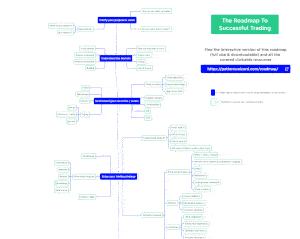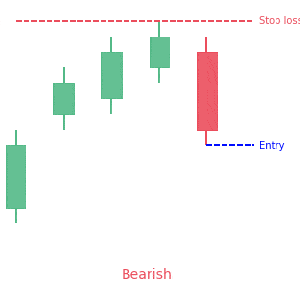- A stock can see its price go to zero.
- Traders can profit from prices rising or dropping.
- Traders can loose more than their initial investment in some cases.
Everyone who wants to enter the arena of the stock market must know that the games played in this arena are risky. Uncertainty is also one of the key characteristics of this arena. Those who are in the game already know and others must know that stock prices widely fluctuate. They even fall below your expectations, especially in a bear market. Besides worrying about uncertainty and unexpected fluctuations, we often wonder about another aspect of the stock market as well. That is “Can a stock be worth zero or be negative?” The answer is;
“Yes, the stock price can drop to extremely low levels, even to zero if the company goes bankrupt. However, the stock price can never be negative.”
Now we know that a stock can worth zero but can never be negative. Still, it doesn’t necessarily mean that you don’t have to lose more money than you invested. It is possible that you lose more money than you invested and end up owing lots of money. It’s time now to move forward. Let’s discuss what happens when a stock goes to 0. Make sure to invest responsibly. For example oil want to negative price once so make sure you understand what you do before to invest any money.
What happens when stock prices go to 0?
The stock price of a company goes to zero when the issuing company goes bankrupt. Investors consider stocks of a bankrupt company worthless. The stock exchange quickly delisted stocks of such a company. The reasons for the bankruptcy of a company are countless such as mismanagement, quality control issues, operational issues, financial problems, and so on. But the result is always the same – worthless and delisted stocks.
What happens when a company goes bankrupt?
When a company goes bankrupt, it can file for any one of the following two types of bankruptcies.
1. Chapter 7
When a company files Chapter 7 bankruptcy, it quickly ceases its operations and the stock market immediately delist its stocks. So, what happens when a stock is delisted? The first step is to compensate the stakeholders and for that non-exempt assets are sold. Creditors, bondholders, preferred stockholders, and finally, common stockholders are always the order of compensation. So we can see those common stockholders get compensated at the very last and therefore, there is a strong possibility that they may not get a penny. How can you lose money in stocks when stocks get delisted? When there isn’t left any money to compensate common stockholders, they are definitely going to end up losing all their investment.
2. Chapter 11
When a company files Chapter 11 bankruptcy, its stocks continue to trade on the stock market. However, the bankruptcy declaration proves very drastic and the consequences are very severe. The company’s stock price drops to the lowest level, even to zero because investors begin to dump the bankrupt company. Furthermore, in some situations, when the bankrupt company plans to reorganize under provisions of Chapter 11 filing, common stocks are canceled. Therefore, in the case of Chapter 11, common stockholders may also get nothing against their investments.
Can you lose more than you invest in stocks?
We know that the stock market is a vibrant, dynamic, and risky arena that can have anything in store for you. You may become one of the richest investors in the world. You may also lose all your investment. You may also win sometimes and lose some other time. Stock markets are never short of uncertainties and surprises. Now, another pertinent question arises here that “can you lose more than you invest in stocks?” Again, the answer is yes. It is possible to lose more than you invest in stocks despite the fact that stock prices never get below zero. There are two possible situations when there are strong chances of losing more than your investment.
1. Trading on Margin
Trading on margin is when you borrow money from a broker and use it alongside your own money to buy stocks. In this case, only leveraged trading is possible and the leverage can vary depending on your own share of money to buy stocks. Trading on margin is a risky game as any loss is multiplied by the leverage. So, if you make a loss more than the price you paid with your own money, you end up owing your broker. So, you can lose more than you invested when trading on margin.
2. Shorting a Stock
Shorting a stock and taking a short position is a risky game even when the issuing company is in a financial crisis. When you take a short position and stock prices quickly rise more than 100%, you will end up losing more than you invested.
How can you make money from a falling stock market?
Falling stock prices bring panic among the investors although there’s no need to panic. Whether the stock market is falling because of an economic crisis or routine volatility, you can take advantage. What you have to do is be calm, take a step back to think about how to take advantage of falling stock prices. The following are some best strategies to make money from a falling stock market.
1. Short-selling
Short-selling is a conventional strategy to make profits from a falling stock market. The strategy is to borrow shares from a broker, sell them at the current market price, and buy the shares back at a further lower price after some time.
Short-sellers return shares to the brokers and take the difference as their profit. However, it is a risky strategy and entails a lot of market analysis and research.
2. ETFs Short Dealing
Exchange-Traded Funds (ETFs) allow an investor to take advantage of declining markets. Dealing with short ETFs is similar to short-selling of stocks except for one thing. In dealing with short ETFs, you have to buy instead of borrowing from a broker.
3. Trading of Safe Heaven Assets
Safe heaven assets are financial instruments such as gold, government bonds, and currencies like the US dollar, Swiss Franc, Japanese Yen, etc. These financial instruments retain, even increase in, their value during a downtrend in the market. They do so because of having a negative correlation with the economy. Safe heaven assets enable you to hedge current holdings and don’t require closing your position or going short. You can take refuge in safe heaven assets by investing in them during downtrends and then earn profits when their prices go up.
4. Other Strategies
You can also make money during falling stock markets by trading currencies, taking long positions on defensive stocks, investing in dividend shares that yield high dividends, options trading, and so on.
Final thoughts
Stock market trading is one of the riskiest and uncertain trading options. Its high price fluctuations can surprise you beyond your imagination. Even though we are aware of a number of stories of market wizards who made millions in the stock market, the stock market can also make you lose substantial money. How can you lose money in stocks? You can lose money because of various reasons. Stock prices can go to zero but negative stock prices aren’t possible. Stock markets are so risky that you can lose more money than you invested. However, there are a few fruitful strategies that you can employ to take full advantage of falling markets. There is no need to panic and feel pressure during a bear market. Good traders and investors don’t panic and make money in both bull and bear markets alike.

 Good Trading requires the Best Charting Tool!
Good Trading requires the Best Charting Tool!

 We loved Marwood Research’s course “Candlestick Analysis For Professional Traders“. Do you want to follow a great video course and deep dive into 26 candlestick patterns (and compare their success rates)? Then make sure to check this course!
We loved Marwood Research’s course “Candlestick Analysis For Professional Traders“. Do you want to follow a great video course and deep dive into 26 candlestick patterns (and compare their success rates)? Then make sure to check this course!